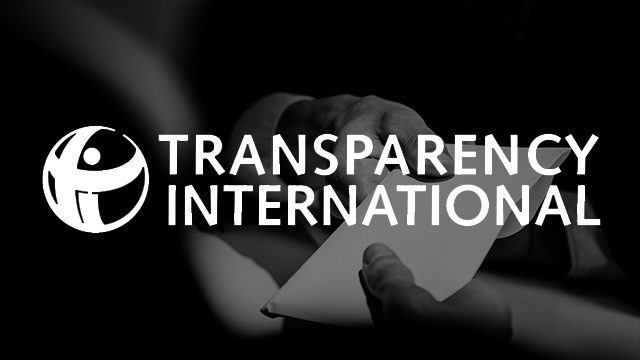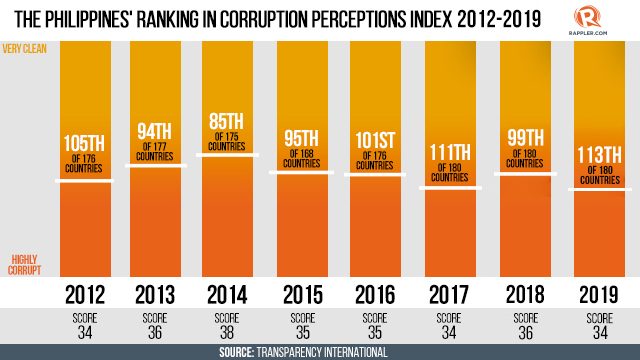SUMMARY
This is AI generated summarization, which may have errors. For context, always refer to the full article.

MANILA, Philippines – The Philippines fared worse in the 2019 Corruption Perceptions Index (CPI) of Transparency International versus 2018.
With a score of 34, the Philippines also ranked lower, falling 14 notches and placing 113th out of 180 countries. It was the country’s lowest ranking since 2012.
The country got the same score as El Salvador, Kazakhstan, Nepal, Eswatini (formerly Swaziland), and Zambia.
In 2018, the country scored 36, and placed 99th among 180 countries.

Worldwide, Transparency International noted in its 2019 report that many nations “are showing little to no improvement in tackling corruption.”
The group then took note of the different protests around the world – from Chile to Czech Republic to Lebanon – where citizens marched “to voice their frustrations in the streets.” They added that citizens are “fed up with corrupt leaders and institutions.”
“The current state of corruption speaks to a need for greater political integrity in many countries. To have any chance of curbing corruption, governments must strengthen checks and balances, limit the influence of big money in politics and ensure broad input in political decision-making,” the group recommended.
Zooming in on the Asia-Pacific region, Transparency International noted that many countries “see economic openness as a way forward,” but many governments across the region “continue to restrict participation in public affairs, silence dissenting voices and keep decision-making out of public scrutiny.”
“Given these issues, it comes as no surprise that vibrant economic powers like China (41), Indonesia (40), Vietnam (37), the Philippines (34) and others continue to struggle to tackle corruption,” the group said.
World rankings
Denmark remained in the top spot, but it was joined by New Zealand in the 2019 index. Both countries obtained a score of 87. In the 2018 index, Denmark received 88 points while New Zealand got the same score of 87.
Finland was in 3rd place in 2019 with a score of 86, followed by Singapore, Sweden, and Switzerland, each with a score of 85 and tied in 4th place.
At the other end of the spectrum, Somalia was deemed the most corrupt with a score of only 9, followed by South Sudan (12), Syria (13), and Yemen (15).
Somalia, South Sudan, and Syria were also the 3 worst performers in 2018.
The global average is 43, the same as in 2017 and 2018.
Western Europe and the European Union remained the region with the best average score with 66, while Sub-Saharan Africa had the worst at 32. Their average regional scores were the same as in 2017 and 2018.
The Asia -Pacific region had an average score of 45, followed by the Americas with 43, the Middle East and North Africa with 39, and Eastern Europe and Central Asia with 35.
In its annual Corruption Perceptions Index, Transparency International scores countries and territories by their perceived levels of corruption in the public sector, aggregating data from various sources that provide perceptions by businesspeople and country experts.
The CPI uses a scale where the higher the score, the least corrupt a country is: 100 is very clean, while zero is highly corrupt. – Rappler.com
Add a comment
How does this make you feel?
There are no comments yet. Add your comment to start the conversation.